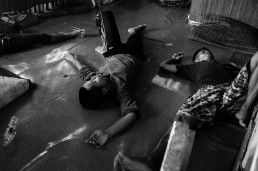A Touch Of Love For The Fragile Souls
A TOUCH OF LOVE FOR THE FRAGILE SOULS
Cheppy A. Muchlis, Kontan
Keris Nangtung Foundation, a non-profit foundation which began operation on July 22nd 2008, dedicates itself to accommodate and rehabilitate people who are mentally ill, especially those who loiter around the streets of Tasikmalaya, West Java.
The foundation relies on people’s donations to stay afloat. The regional government provides the land, which hosts the site of the foundation, in an area that had formerly been utilized as a bus terminal in Tasikmalaya; but all operational costs are borne by the foundation and its stream of donations.
Today, the facility has admitted 134 patients in eight rooms—each of which had once been utilized as business stalls. Even so, the facility is a far cry from a decent mental hospital where these patients should be receiving their treatments. The rooms are lacking basic necessities such as adequate lighting, beds, and blankets.
Due to the shortage of manpower and funds, the foundation has little choice but to recruit patients who are thought to be ‘almost cured’ of their mental problems to help fellow patients who are in worse conditions.
And the facility’s approach to curing the mentally disturbed has little to do with medical treatments. Dadang Heriadi (45) as the facility’s director claims that they have been using the method of a ‘human touch’ (treating the patients as normal people) to rid the patients of their mental diseases. And each patient is addressed familiarly as dulur, which means ‘Relative’ in Javanese.
There are only three active therapists working at the facility, including the director. They have little knowledge—if at all—of what it takes to treat mentally disturbed individuals and they have been learning how to deal with the patients on a case by case basis.
According to the data released by BBC Indonesia, the country only has a total of 616 psychiatrists to treat 237 million people, which roughly comes down to one psychiatrist per 400,000 people. Of course, this is hardly enough and quite embarrassing—considering that, ideally, there should be one psychiatrist available for every 30,000 population count.
Based on the above data, we should be thankful that there are those who do get to return to society after suffering from a bout of mental illness. Yet what of those who still suffer from mental illness—will they get their opportunity to live their lives fully?
Empowerment: An assistance effort from an individual or a group toward other individuals or groups to raise the quality of life.












